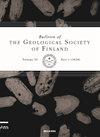芬兰西南部Haveri地区玄武岩和长英质岩脉的锆石定年
IF 1.3
4区 地球科学
Q2 GEOLOGY
引用次数: 2
摘要
E-MORB型哈维里玄武岩与坦佩雷带的火山弧型岩石不同,没有显示俯冲特征。它被认为是在火山弧之前的边缘盆地中形成的。我们在这里给出了两个样品的锆石U-Pb测年。玄武岩和长英质岩脉的207Pb/206Bb年龄分别为1902±5Ma和1891±2Ma,被解释为结晶年龄。玄武岩还含有较老的1.98 Ga颗粒,而长英质岩脉含有较老1.92 Ga、1.94 Ga、1.9 8 Ga和2.0 Ga颗粒。E-MORB型玄武岩的年龄测定可用于识别增生Svecofennian造山运动的伸展事件。本文章由计算机程序翻译,如有差异,请以英文原文为准。
Zircon dating of the basalt and felsic dyke in Haveri, SW Finland
The E-MORB type Haveri basalt differs from the volcanic arc type rocks in the Tampere belt showing no subduction signature. It is considered to have formed in a marginal basin prior to the volcanic arc. We present here zircon U-Pb dating on two samples. The basalt and the felsic dyke yielded 207Pb/206Pb ages of 1902 ± 5 Ma and 1891 ± 2 Ma, respectively, interpreted as crystallisation ages. The basalt also contains older 1.98 Ga grains while the felsic dyke contains older 1.92 Ga, 1.94 Ga, 1.98 Ga and 2.0 Ga grains, which are inferred as inherited. The age dating of E-MORB type basalts can be used to identify the extensional episodes of the accretionary Svecofennian orogeny.
求助全文
通过发布文献求助,成功后即可免费获取论文全文。
去求助
来源期刊
CiteScore
1.30
自引率
0.00%
发文量
5
审稿时长
>12 weeks
期刊介绍:
Bulletin of the Geological Society of Finland (BGSF) publishes research articles and short communications in all branches of geosciences. Contributions from outside Finland are welcome, provided that they contain material relevant to Finnish geology or are of general interest.

 求助内容:
求助内容: 应助结果提醒方式:
应助结果提醒方式:


